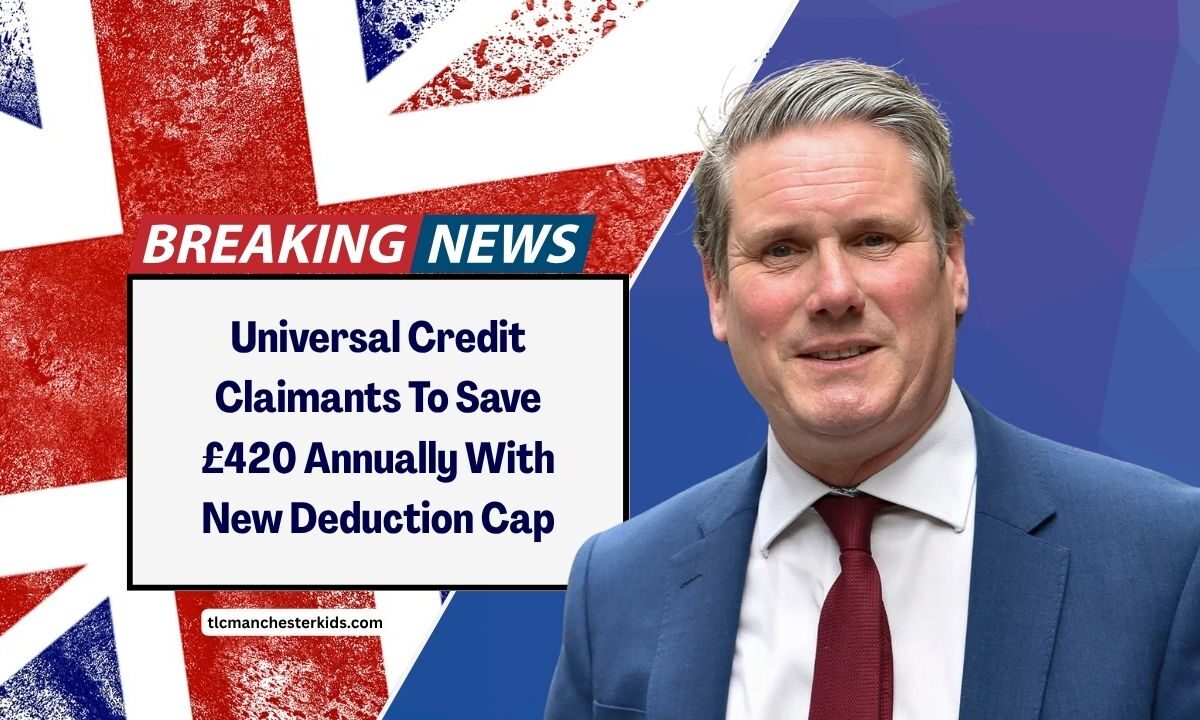Starting July 30, 2025, the UK government has implemented a major policy reform aimed at easing financial pressure on more than 1.2 million Universal Credit users, including 700,000 families with children.
The new “Fair Repayment Rate” reduces the maximum deduction from 25% to 15% of the standard Universal Credit allowance—resulting in average annual savings of £420 per household.
This change arrives at a time when many low-income households continue to struggle with rising living costs and inflation.
With less being deducted from their monthly support, thousands of people will now have more room in their budget to afford essentials like food, rent, and energy.
What Is the Fair Repayment Rate?
The Fair Repayment Rate is a newly introduced deduction policy by the Department for Work and Pensions (DWP). It reduces the amount the DWP can deduct from monthly Universal Credit payments to recover debts.
Key Details of the Reform:
| Feature | Details |
|---|---|
| Effective Date | July 30, 2025 |
| Old Deduction Cap | 25% of Universal Credit allowance |
| New Deduction Cap | 15% |
| Average Annual Savings | £420 |
| Households Benefiting | 1.2 million (700,000 with children) |
| Applies To | Advance payments, arrears, overpayments |
| Not Covered | Fraud, sanctions, court fines |
This move is designed to improve financial stability and prevent long-term debt spirals among Universal Credit claimants.
Why This Change Was Introduced
The old system allowed deductions of up to 25%, which often left households without enough money to cover essential living costs.
According to prior reports, more than half of Universal Credit recipients were experiencing some form of deduction, with many reaching the full 25% limit.
Debt charities and anti-poverty advocates had long criticized the previous structure, arguing it left people unable to meet basic needs and often pushed them toward more borrowing or food bank reliance.
By lowering the cap to 15%, the government aims to offer a more compassionate and sustainable approach to debt recovery within the benefits system.
What Debts Are Included?
The new 15% cap applies to several types of recoverable debt, including:
- Universal Credit advance repayments
- Budgeting advance repayments
- Benefit overpayments
- Rent arrears
- Utility bill debts
- Council tax arrears
- Social Fund loan repayments
However, deductions related to fraud, sanctions, and court-imposed fines may still exceed the new 15% cap.
Automatic Adjustments for All Claimants
One of the most helpful aspects of this reform is that no application is required. The change has been automatically applied from July 30, 2025, and should be visible in your next Universal Credit statement.
Example Scenario:
James, a single father in Liverpool, was previously receiving £600 per month. Under the old system, he had £150 (25%) deducted for existing debts.
With the new 15% rule, that deduction drops to £90, meaning James now receives an extra £60 each month—adding up to £720 in annual savings.
Real-Life Impact of the Change
This policy shift is expected to have a significant impact on household finances:
- Increased spending power to cover essentials
- Improved mental well-being by easing financial stress
- Less reliance on payday loans or food banks
- Support for families with children, helping with school and childcare costs
This reform is a key part of the government’s broader Plan for Change, which also includes:
- £742 million extension of the Household Support Fund
- Free breakfast clubs for all English primary schools
- Job retention and employment programs for low-income workers
Tips for Claimants: What to Do Now
- Log in to your Universal Credit account and check your latest payment breakdown to confirm the 15% cap is active.
- Use the extra funds wisely—focus on covering essentials like rent, food, and utilities.
- Avoid taking on new debt. The additional money should be used to stabilize your finances, not open new financial commitments.
- Reach out for help. If you’re still in financial difficulty, contact Citizens Advice or your local council for further support.
The Universal Credit repayment cap reduction from 25% to 15%, effective July 30, 2025, is a crucial reform delivering £420 in annual savings to over a million households.
It marks a shift toward more compassionate policy-making that gives people more control over their finances without compromising debt recovery goals.
FAQs
Who qualifies for the £420 annual savings under the new rule?
Anyone on Universal Credit who had deductions under the previous 25% rate will now benefit from the lower 15% cap.
Do I need to apply for the new repayment rate?
No, the adjustment is automatic and started with the July 30, 2025 assessment period.
Are all types of deductions included in the 15% cap?
No. Deductions for fraud, sanctions, and court fines can still go above the 15% threshold.




